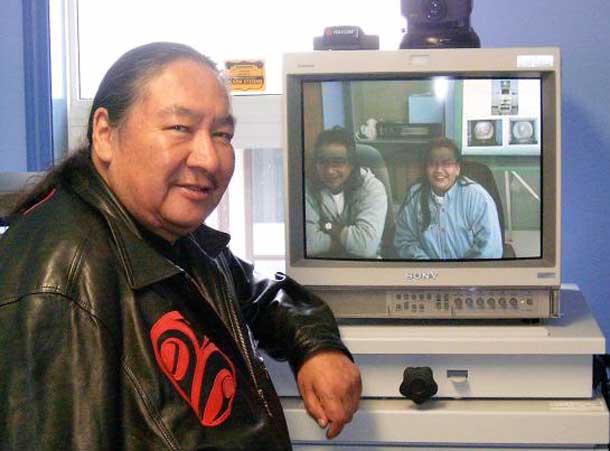 Elijah THUNDER BAY – The family of Elijah Harper regrets to announce the passing of the much loved, respected and influential Cree leader and Indigenous activist. He passed away early May 17th as a result of cardiac failure due to diabetes complications.
Elijah THUNDER BAY – The family of Elijah Harper regrets to announce the passing of the much loved, respected and influential Cree leader and Indigenous activist. He passed away early May 17th as a result of cardiac failure due to diabetes complications.
His wife, Anita Olsen Harper, his children and the Harper family offered the following statement:
“Elijah was a wonderful man, father, partner. He was a true leader and visionary in every sense of the word. He will have a place in Canadian history, forever, for his devotion to public service and uniting his fellow First Nations with pride, determination and resolve. Elijah will also be remembered for bringing Aboriginal and non‐Aboriginal people together to find a spiritual basis for healing and understanding. We will miss him terribly and Love him forever.”
Elijah is survived by his loving wife Anita Olsen Harper, his devoted children Bruce and Holly. He was step‐father to Karen Lawford, Dylan, Gaylen and Grant Bokvist. He is predeceased by his daughter Tanya.
“On behalf of the Assembly of First Nations National Executive, I offer sincere condolences to the family, friends and all First Nations in Manitoba region and across Canada mourning the loss of a tireless and courageous leader of our peoples,” said Assembly of First Nations National Chief Shawn Atleo. “Elijah’s commitment and dedication to asserting and upholding First Nation rights and recognition has helped lay a solid foundation as this hard work continues today. Leading two Sacred Assemblies focused on finding a spiritual basis for healing and understanding between Indigenous and non-Indigenous peoples, Elijah’s drive and actions toward reconciliation will continue to be a legacy for First Nation and all Canadians as we move toward improved and renewed relationships based on mutual respect and recognition – two things he stood firm on in all of his work.”
“Chief Elijah Harper was a friend, a confidant and a leader who was an inspiration and role model for me,” said Nishnawbe Aski Nation Grand Chief Harvey Yesno. “The First Nations community have lost a great man who led our people for years, was a champion for Treaty and aboriginal rights who inspired many, built bridges between the aboriginal and non-Aboriginal worlds and changed the direction of an entire country.”
Anishinabek Nation Grand Council Chief Patrick Madahbee, who regarded Mr. Harper as a close, personal friend says his passing represents an enormous loss for everyone who truly wants Canada to be the best country it can be.
“Nobody understood better the concept of First Nations sovereignty, and the positive impact that it will have on Canada’s cultural, social and economic well‐being,” says the Grand Council Chief. “We will miss his courageous and inspirational voice, and send our sincere condolences to members of his family.”
The Late Elijah Harper was born on March 3, 1949 at Red Sucker Lake First Nation in northeastern Manitoba. He was educated at residential school and later studied at the University of Manitoba.
Elijah began his long career in public service when he was elected Chief of his community at the young age of 29. In 1981, he was elected as Member of the Manitoba Legislative Assembly for Rupertsland, an office he held for 11 years. He was the first elected First Nations person to serve as MLA. In 1996, he was appointed to the Manitoba cabinet as Minister without portfolio for Native Affairs, and in 1997, as Minister of Northern Affairs.
He was best known for his historic role in blocking the Meech Lake accord. Many Canadians will remember the humble, yet, iconic figure, seated in the House of Assembly raising his ever‐present eagle feather refusing unanimous consent of the Manitoba Legislative Assembly. As result, he was recognized as Newsmaker of the Year by the Canadian Press in 1990.
In 1993, Elijah was elected for one term as Member of Parliament for the Churchill riding. In January 1998, he served a term as Commissioner for the Indian Claims Commission.
Red Sucker Lake First Nation bestowed him the title of Honourary Chief for Life for his heroic work. He is also the recipient of the Commemorative Medal of Canada, a National Aboriginal Achievement Award, the Order of Merit from St. Paul’s University, the Order of the Sash from the Manitoba Métis Federation, and the Gold Eagle Award from the Indigenous Women’s Collective in Manitoba.
Following his active career in public service, Elijah spent much of the rest of his life visiting First Nations, meeting with Indigenous leaders across North America, working with charities, and doing international humanitarian work.













